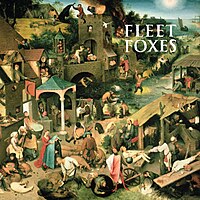
Band: June of 44
Album: Tropics and Meridians
Best song: "Anisette." Hands down.
Worst song: Nope.
Maybe this is foolish, but I sometimes wonder if Wikipedia is the real measure of something (anything, really) and its q rating. If something or someone has a Wikipedia page, it truly exists in the world. If said Wikipedia page is of some substance, it is truly popular and is (or has been) on a lot of people's radar.
Maybe that's common sense, but Pink Floyd, for example, has a really big Wikipedia page. And the Floyd page is considerably more detailed than, say, that of Camera Obscura.
This can be somewhat troubling to me. Tortoise's page isn't anything to write home about. And today's subject, June of 44, hardly has a Wikipedia page at all.
It's like one of my favorite bands never existed. That's upsetting.
---
I've seen two bands twice in one week. Calexico was one, though the second show was a CMJ showcase show, so the band only played a short set in the second show of the week.
A few years earlier, though, I had seen June of 44 twice in one week. It was my freshman year of college and June of 44 was one of my favorite bands. The band had released the sublime Anahata -- a record I'd reviewed for a local zine as a high schooler -- the previous spring and was touring it across the United States.
So, a sophomore friend of mine asked if I wanted to see June of 44 in St. Louis on a Monday. Though I had a fair amount of work to do -- really, not a hurdle for me as I was never a good student -- I said I'd do it. So, we drove the two hours each way to the Side Door, a little club in a shitty neighborhood in St. Louis and June of 44 fucking rocked.
Cut to Thursday and the same guy asked if I wanted to see the band again. I remember thinking that this was a very odd thing to do; we would be driving 150 miles the other direction to see a very similar show in another town.
I'm not sure why I did it. It might have been the freshman mindset, that anything was possible now that I was a college man (not boy. Man.). Maybe it was the fact that I knew I wasn't going to drive. Maybe it was my wanting to impress someone with some pull at the radio station -- he would become Program Director the next year -- by being up for seeing a band I'd just seen. Maybe I knew that I wasn't going to drive and could sleep on the way back from the show.
The sets were similar and I don't remember much in the way of greatness. June of 44 was a methodical band live. They rode their steady music like the force that it was. Anahata isn't the record it should be -- after all, June of 44 liked to branch out -- but those shows were worth it. What an experience.
---
I came to Tropics and Meridians in a way that I really dove into independent music. My junior year of high school, I took over the music director position at our station. Fueled by WNUR and a love of Chicago's scene, I borrowed and taped everything that was on Touch and Go's distributed labels (Merge, Quarterstick, Thrill Jockey, T&G itself, Atavistic and Drag City).
Tropics and Meridians was selected solely because it was on Quarterstick Records. Full of nautical references -- the whole band seemed to be based on such references -- T&M is stilted and amazing. It has hard-charging drums, crazed vocals and angular guitars.
Indeed, the "single" was "Lusitania," a song named after a famous downed ship. Whispered vocals turn into screaming, taking a Slint-esque approach to a crescendo as the guitars dance around one another to a climax. Dynamics rule the song.
"June Leaf" shuffles, but breaks into two guitars using harmonics to create a lead guitar line, while the quick drum line edges. The dual vocals bring the song up and down. Shifting rhythms mean math rock on this record.
"Sanctioned in a Birdcage" is crazy, with a yelled/spoken lyric over guitars that fall between harmonics and angular riffs. Rhythmically, it dances around the drumset with a steady backbeat.
The album's highlight, though, is its opener, "Anisette." Nine minutes of a looping, hummable bass line ends up with the band shifting time signatures and loudness. The band starts and stops around a riffing guitar and a screaming Jeff Mueller. It's intense, to say the least.
---
God, did I listen to a lot of T&M in high school. I love Four Great Points, the band's follow up. But, man, you'll never forget your first. T&M was my first exposure to June of 44 and one of my first entries into indie rock.
I had two June of 44 t-shirts, one I bought at a show and the other I bought through Touch and Go's mail order catalog.





